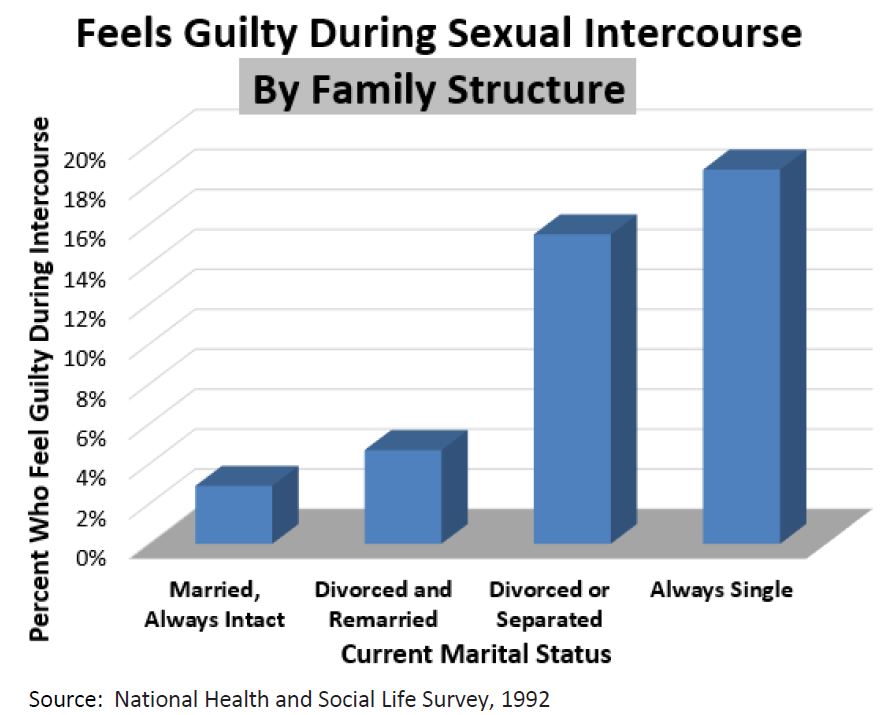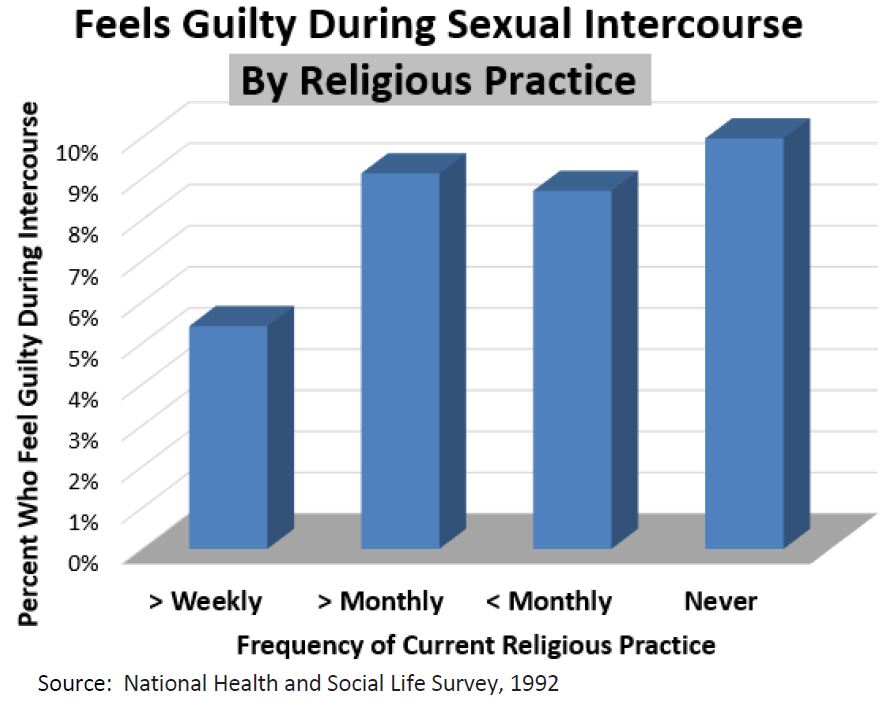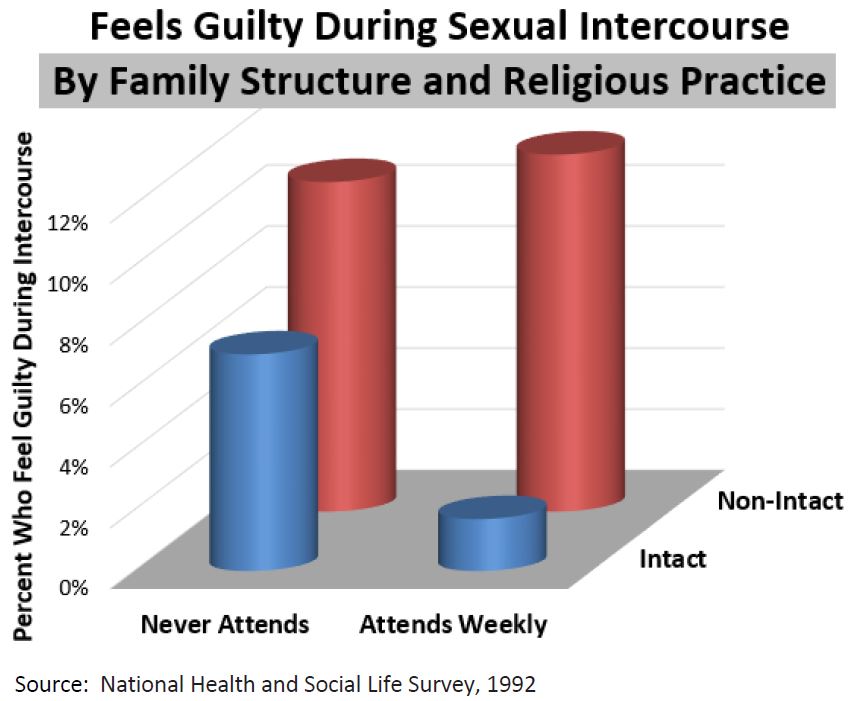Click Here to download “Feels Guilty During Sexual Intercourse by Family Structure and Religious Practice”
Feels Guilty During Sexual Intercourse by Family Structure and Religious Practice
The 1992 National Health and Social Life Survey shows that, of adults aged 18 to 59, those in intact marriages who worshiped weekly at the time of the survey were least likely to feel guilty during intercourse with their current sexual partner.
[1]
Family Structure: Those in always-intact marriages were least likely (2.9 percent) to feel guilty during intercourse with their current sexual partner, followed by those who were divorced and remarried (4.7 percent), those who were divorced or separated (15.5 percent), and those who were always single (18.7 percent).
 Religious Practice:
Religious Practice: Those who worshiped weekly at the time of the survey were least likely to feel guilty during intercourse with their current sexual partner (5.4 percent), followed by those who worshiped less than monthly (8.7 percent), those who worshiped less than weekly but at least monthly (9.1 percent), and those who never worshiped (10 percent).
 Family Structure and Religious Practice Combined:
Family Structure and Religious Practice Combined: Those in intact marriages who worshiped weekly were much less likely to feel guilty during intercourse with their current sexual partner (1.7 percent), followed by those in intact marriages who never worshiped (7.1 percent). Those in non-intact family structures and singles who never worshiped (10.8 percent) and those in non-intact family structures and singles who worshiped weekly (11.7 percent) were most likely to feel guilty.
 Related Insights from Other Studies:
Related Insights from Other Studies: Couples in intact marriages were least likely to have committed adultery.
[2] This may contribute to the fact that they were the least likely to feel guilty during intercourse with their current partners. Furthermore, the incidence of adultery was lowest among those who worship weekly (12.4 percent), compared to those who worshipped less than weekly but at least monthly (17.1 percent), less than monthly (20.6 percent), or never (24.8 percent).
[3]
Analysis of always-single undergraduate males and females found that those “predisposed to respond with guilt over sex” (those it classified as “high-guilt”) were less likely to participate in more intimate sexual activity.
[4] High-guilt undergraduate men cited moral beliefs (among other reasons) as their rationale for not participating in intercourse more than “low-guilt” undergraduate men, and moral belief was the reason for nonparticipation that primarily divided high-guilt and low-guilt undergraduate women (high-guilt women were reported far more often that they believed various sexual behaviors to be wrong than low-guilt women).
[5]
[1] These charts draw on data collected by the 1992 National Health and Social Life Survey
[2] Patrick F. Fagan and Althea Nagai, “Adultery by Marital Status.” Available at http://www.frc.org/mappingamerica/mapping-america-74-adultery-by-marital-status. Accessed August 26, 2011.
[3] Marriage and Religion Research Institute, “The Benefits of Religious Worship: Positive Outcomes Associated with Weekly Worship,” (2011): 8. Available at www.marri.us/benefits-religious-worship. Accessed July 3, 2012.
[4] Donald L. Mosher and Herbert J. Cross, “Sex Guilt and Premarital Sexual Experiences of College Students,”
Journal of Consulting and Clinical Psychology 36, no. 1 (1971): 30.
[5] Donald L. Mosher and Herbert J. Cross, “Sex Guilt and Premarital Sexual Experiences of College Students,”
Journal of Consulting and Clinical Psychology 36, no. 1 (1971): 31.]]>
 Religious Practice: Those who worshiped weekly at the time of the survey were least likely to feel guilty during intercourse with their current sexual partner (5.4 percent), followed by those who worshiped less than monthly (8.7 percent), those who worshiped less than weekly but at least monthly (9.1 percent), and those who never worshiped (10 percent).
Religious Practice: Those who worshiped weekly at the time of the survey were least likely to feel guilty during intercourse with their current sexual partner (5.4 percent), followed by those who worshiped less than monthly (8.7 percent), those who worshiped less than weekly but at least monthly (9.1 percent), and those who never worshiped (10 percent).
 Family Structure and Religious Practice Combined: Those in intact marriages who worshiped weekly were much less likely to feel guilty during intercourse with their current sexual partner (1.7 percent), followed by those in intact marriages who never worshiped (7.1 percent). Those in non-intact family structures and singles who never worshiped (10.8 percent) and those in non-intact family structures and singles who worshiped weekly (11.7 percent) were most likely to feel guilty.
Family Structure and Religious Practice Combined: Those in intact marriages who worshiped weekly were much less likely to feel guilty during intercourse with their current sexual partner (1.7 percent), followed by those in intact marriages who never worshiped (7.1 percent). Those in non-intact family structures and singles who never worshiped (10.8 percent) and those in non-intact family structures and singles who worshiped weekly (11.7 percent) were most likely to feel guilty.
 Related Insights from Other Studies: Couples in intact marriages were least likely to have committed adultery.[2] This may contribute to the fact that they were the least likely to feel guilty during intercourse with their current partners. Furthermore, the incidence of adultery was lowest among those who worship weekly (12.4 percent), compared to those who worshipped less than weekly but at least monthly (17.1 percent), less than monthly (20.6 percent), or never (24.8 percent).[3]
Analysis of always-single undergraduate males and females found that those “predisposed to respond with guilt over sex” (those it classified as “high-guilt”) were less likely to participate in more intimate sexual activity.[4] High-guilt undergraduate men cited moral beliefs (among other reasons) as their rationale for not participating in intercourse more than “low-guilt” undergraduate men, and moral belief was the reason for nonparticipation that primarily divided high-guilt and low-guilt undergraduate women (high-guilt women were reported far more often that they believed various sexual behaviors to be wrong than low-guilt women).[5]
[1] These charts draw on data collected by the 1992 National Health and Social Life Survey
[2] Patrick F. Fagan and Althea Nagai, “Adultery by Marital Status.” Available at http://www.frc.org/mappingamerica/mapping-america-74-adultery-by-marital-status. Accessed August 26, 2011.
[3] Marriage and Religion Research Institute, “The Benefits of Religious Worship: Positive Outcomes Associated with Weekly Worship,” (2011): 8. Available at www.marri.us/benefits-religious-worship. Accessed July 3, 2012.
[4] Donald L. Mosher and Herbert J. Cross, “Sex Guilt and Premarital Sexual Experiences of College Students,” Journal of Consulting and Clinical Psychology 36, no. 1 (1971): 30.
[5] Donald L. Mosher and Herbert J. Cross, “Sex Guilt and Premarital Sexual Experiences of College Students,” Journal of Consulting and Clinical Psychology 36, no. 1 (1971): 31.]]>
Related Insights from Other Studies: Couples in intact marriages were least likely to have committed adultery.[2] This may contribute to the fact that they were the least likely to feel guilty during intercourse with their current partners. Furthermore, the incidence of adultery was lowest among those who worship weekly (12.4 percent), compared to those who worshipped less than weekly but at least monthly (17.1 percent), less than monthly (20.6 percent), or never (24.8 percent).[3]
Analysis of always-single undergraduate males and females found that those “predisposed to respond with guilt over sex” (those it classified as “high-guilt”) were less likely to participate in more intimate sexual activity.[4] High-guilt undergraduate men cited moral beliefs (among other reasons) as their rationale for not participating in intercourse more than “low-guilt” undergraduate men, and moral belief was the reason for nonparticipation that primarily divided high-guilt and low-guilt undergraduate women (high-guilt women were reported far more often that they believed various sexual behaviors to be wrong than low-guilt women).[5]
[1] These charts draw on data collected by the 1992 National Health and Social Life Survey
[2] Patrick F. Fagan and Althea Nagai, “Adultery by Marital Status.” Available at http://www.frc.org/mappingamerica/mapping-america-74-adultery-by-marital-status. Accessed August 26, 2011.
[3] Marriage and Religion Research Institute, “The Benefits of Religious Worship: Positive Outcomes Associated with Weekly Worship,” (2011): 8. Available at www.marri.us/benefits-religious-worship. Accessed July 3, 2012.
[4] Donald L. Mosher and Herbert J. Cross, “Sex Guilt and Premarital Sexual Experiences of College Students,” Journal of Consulting and Clinical Psychology 36, no. 1 (1971): 30.
[5] Donald L. Mosher and Herbert J. Cross, “Sex Guilt and Premarital Sexual Experiences of College Students,” Journal of Consulting and Clinical Psychology 36, no. 1 (1971): 31.]]>
